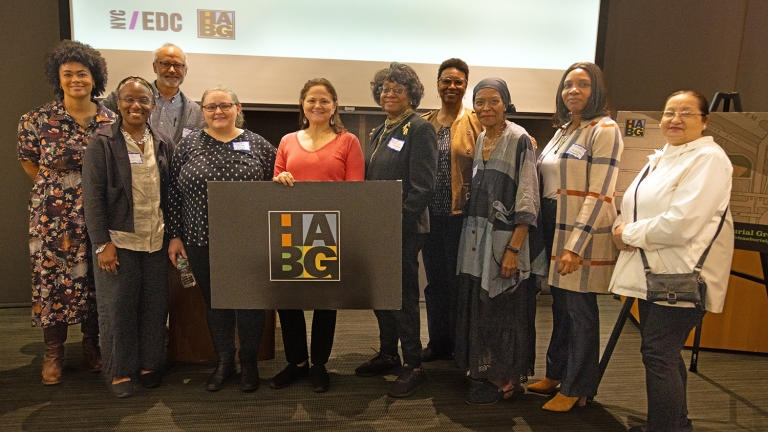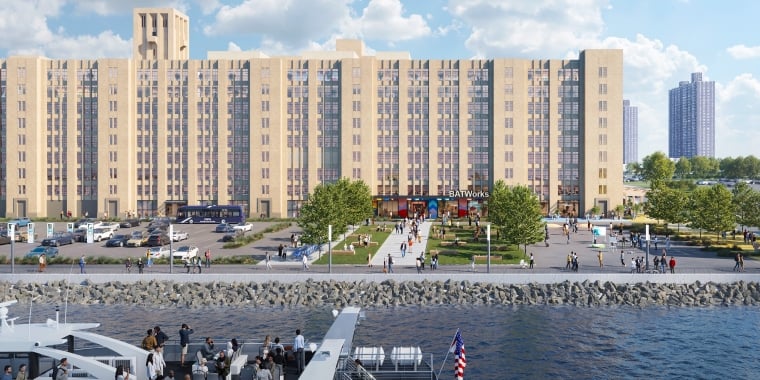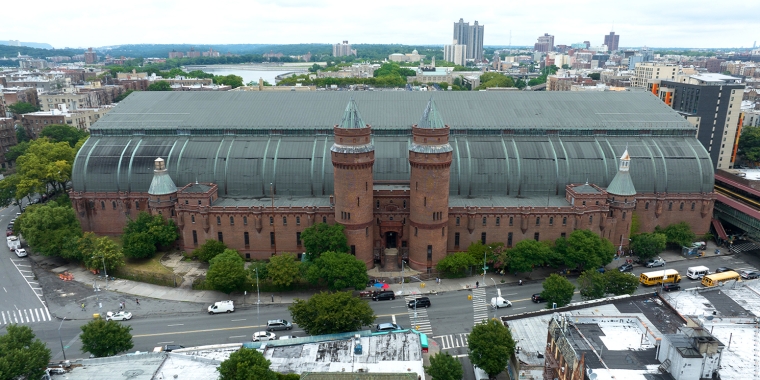NYCEDC Announces Major Milestone in Memorialization of Harlem African Burial Ground

NYCEDC Selects Bridge Philanthropic Consulting to Lead Education and Engagement Campaign to Raise Awareness About the Historic Harlem African Burial Ground
Last Fall NYCEDC Announced New Phase of Archaeological Work and Future Vision for the Historic Site
NEW YORK, NY—New York City Economic Development Corporation (NYCEDC) and the Harlem African Burial Ground Initiative (HABGI) today announced the selection of Bridge Philanthropic Consulting (BPC) as the lead consultant for the education and engagement services around the history and cultural impact of the historic Harlem African Burial Ground. Located within the site of the decommissioned 126th Street Bus Depot in East Harlem on 126th Street between 1st and 2nd Avenues, NYCEDC has worked over a decade in partnership with HABGI and its predecessor, the Harlem African Burial Ground Task Force, to develop a vision and goals for memorialization of the Harlem African Burial Ground and revitalization of the bus depot site. The site is also part of Mayor Adams administration’s “24 in 24” plan that aims to advance 24 affordable housing projects on public sites in 2024 that will ultimately create or preserve over 12,000 units of housing.
Through an 18-month education and engagement campaign, BPC will work alongside Harlem Cultural Archives and NYCEDC to deliver high-quality community events and raise awareness at a local, regional, and national supporters to restore honor, dignity, and respect to those buried at this sacred site. The education and engagement effort will happen in coordination with the robust archaeological work on the Harlem African Burial Ground to ensure that new information can be incorporated into community engagement materials and activities.
“The Harlem African Burial Ground is a vital piece of New York’s past. We look forward to working with BPC to preserve and honor the lives of those buried here, while emphasizing the importance of an inclusive public history,” said Deputy Mayor for Housing, Economic Development and Workforce Maria Torres-Springer. “I want to thank NYCEDC and HABGI for their work on realizing this ambitious project that includes affordable housing, local jobs, community space, and a historic new memorial.”
“NYCEDC is thrilled to partner with Bridge Philanthropic Consulting, who bring an extensive background in the preservation and protection of history and cultural impact of Black identity and communities, and we look forward to working with them on the Harlem African Burial Ground,” said NYCEDC President & CEO Andrew Kimball. “As we prepare for the next phase of archaeological work, BPC’s campaign is going to greatly benefit Harlem and communities across New York City as we invite New Yorkers to learn about and reflect on the significance of this historic site.”
The work will kick off in March 2024, beginning by identifying, cultivating, and stewarding community relationships in collaboration with NYCEDC and HABGI. The next phase involves a communications plan to tell the historical, social, and present-day story of the Harlem African Burial Ground. The story will include age-appropriate curriculums that engage Harlem students, multimedia content, a website to raise visibility and create excitement throughout Harlem and beyond, and other outreach efforts such as a series of public events and workshops throughout the year. A final report summarizing the impact of this effort will be released in 2025.
“For more than 14 years, The Harlem African Burial Ground Initiative, formerly known as the Harlem African Burial Ground Task Force has worked tirelessly to honor and memorialize our forgotten ancestors and with preparations for the next phase of archaeological work underway, it is crucial that we create awareness about the Harlem African Burial Ground and the significance it has for Harlem communities,” said Harlem African Burial Ground Initiative Leadership Dr. Patricia A. Singletary, Melissa Mark-Viverito, Sharon Wilkins, and Melinda Velez. “We welcome Bridge Philanthropic Consulting to this historic project and look forward to working with them on shedding a light on New York City’s history of enslaved and free New Yorkers of African descent.”
“We are elated that the New York City Economic Development Corporation (NYCEDC) has selected Bridge Philanthropic Consulting (BPC) as its prime partner to provide education and engagement services for the 126th Street Harlem Burial Ground. This work is at the core of our mission as a firm in working with sacred historic preservation projects that amplify cultural tourism for multi-generations. We have teamed with a group of well-known experts on key areas for a successful implementation, such as the Harlem Cultural Archives, Iconic Designer and African Burial Grounds Expert Rodney Leon, designer of the African Burial Ground Memorial in New York City, One Hundred Black Men of New York, along with other Harlem-based community organizations,” said Bridge Philanthropic Consulting CEO Dwayne Ashley.
The 126th Street Harlem African Burial Ground Memorial and Mixed-Use Project was developed through a community-based planning process led by NYCEDC, HABGI, and approved through the ULURP process in 2017 with support from Community Board 11. The project will honor and memorialize the Harlem African Burial Ground with a public outdoor memorial on the entire historic footprint of the burial ground, and an indoor cultural education center providing public programming about the burial ground and its history. These will be publicly owned spaces, accessible to all.
NYCEDC plans to release public RFPs for both an operator of the cultural education center and steward of the outdoor memorial and for a developer of the mixed-use project after the conclusion of the archaeological fieldwork on site.
The project will also address affordable housing and job creation needs in Harlem on the remainder of the site through a mixed-use program including hundreds of units of housing, a minimum of 80 percent of which will be income-restricted affordable homes, job-creating commercial space, and additional community space.
To learn about the history of the Harlem African Burial Ground is to learn about the history of New York City and we must ensure that New Yorkers not only learn about the significance of this site but the impact it has had in the Harlem community,” said Deputy Speaker of the New York City Council Diana Ayala. “We look forward to working with Bridge Philanthropic Consulting, NYCEDC, fellow colleagues in City and State office, our constituents, and New Yorkers as we prepare for the next phase of archaeological work and future redevelopment.”
“As we work to restore this sacred site, telling the story of the Harlem African Burial Ground is a vital part of this process. This will honor the legacy of those buried here, share their narratives, and preserve an invaluable part of our collective heritage,” said Manhattan Borough President Mark Levine. “The unveiling of this history will not only deepen our understanding but also inspire a renewed commitment to inclusivity, education, and remembrance for the communities of East Harlem, Harlem, and beyond.”
“The Harlem African Burial Ground will have a monumental impact in our efforts to remember our past, reflect on our history, and build a future that is inclusive of all who call our city home,” said Congressman Adriano Espaillat (NY-13). “Congratulations to Bridge Philanthropic Consulting (BPC) on its selection as the lead firm to bring us one step closer to completing this project and bringing it to fruition. This is a historic moment that will continue to impact our community and entire city for generations to come.”
“Over centuries, this site was neglected and developed over, erasing the early history of the city's first black residents. This restoration is crucial to honor and memorialize the lives of those buried at this sacred site, providing dignity and respect that is centuries overdue,” said New York State Assemblymember Ed Gibbs. This memorialization and restoration serve to reclaim and preserve a rich and compelling American narrative that has been lost for over three centuries, contributing to a more complete understanding of American History and life in colonial New York. The plans for a new cultural center and mixed-use development will do exciting things for the East Harlem community; creating affordable housing, employment opportunities, education, and community space.”
“The Harlem African Burial Ground is an important piece of history within East Harlem. The efforts to tell the story of this site not only uplifts the community but also contributes to the creation of affordable housing and new job opportunities,” said New York State Senator José M. Serrano. “The selection of Bridge Philanthropic Consulting (BPC) to deliver education and engagement services at the 126th Street Harlem Burial Ground marks a significant stride toward the overarching goal of establishing a community space centered around cultural education at this historical site.”
To ensure that the significant economic impacts of this project benefit the community, the City is prioritizing local hiring by requiring that the eventual developer create a Targeted Hiring Outreach plan in accordance with HPD guidelines, participate in the HireNYC Construction Program, make a financial contribution to one or more job training programs in the City, and use best efforts to hit HireNYC’s Hiring, Retention, Advancement, and Training goals.
Bridge Philanthropic Consulting has worked on several relevant projects including the National Juneteenth Museum in Fort Worth, Texas; the Enslaved African Memorial in Bergen County, New Jersey; Mount Zion – Female Union Band Society Historic Memorial Park, Washington, D.C.; and other projects in New York City including Hurricane Ida Outreach in partnership with New York City Emergency Management and The City of New York Taskforce on Racial Inclusion and Equity, among others.
To learn more about Bridge Philanthropic Consulting, please visit their website. To learn more about the Harlem African Burial Ground, please visit the HABGI’s Instagram and NYCEDC’s 126th Street Harlem African Burial Ground Memorial and Mixed-Use Project webpage.
About NYCEDC
New York City Economic Development Corporation is a mission-driven, nonprofit organization that works for a vibrant, inclusive, and globally competitive economy for all New Yorkers. We take a comprehensive approach, through four main strategies: strengthen confidence in NYC as a great place to do business; grow innovative sectors with a focus on equity, build neighborhoods as places to live, learn, work, and play; and deliver sustainable infrastructure for communities and the city's future economy. To learn more about what we do, visit us on Facebook, Twitter, LinkedIn, and Instagram.
About Harlem African Burial Ground Initiative
Founded in 2009, the Harlem African Burial Ground Initiative (formerly known as the Harlem African Burial Ground Task Force) is a group of community leaders whose goal is to advocate for and guide remembrance, honoring, and memorialization for the Harlem African Burial Ground. HABGI is led by former District 8 City Council Member and Speaker Melissa Mark-Viverito, Pastor Emerita of Elmendorf Reform Church Rev. Dr. Patricia A. Singletary, former Manhattan Deputy Borough Historian Sharon Wilkins, and former Legislative Advisor and East Harlem resident Melinda Velez. To learn more about the Harlem African Burial Ground Initiative’s advocacy work, please visit HABGI’s Instagram.
About Bridge Philanthropic Consulting/ Harlem Cultural Archives
Bridge Philanthropic Consulting is a Black-owned full-service project management, marketing, and communications firm with extensive consulting experience in the public and non-profit sector, focused on social impact work. Harlem Cultural Archives is a nonprofit dedicated to preserving, collecting, and sharing materials documenting Harlem’s remarkable and varied multicultural legacies, including its storied past as well as its continuing contributions to the City and State of New York.


